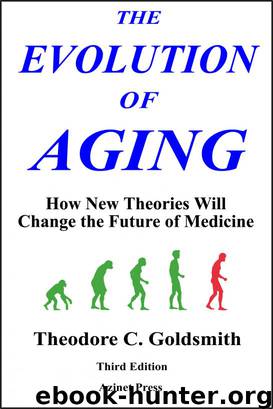The Evolution of Aging: How New Theories Will Change Medicine by Theodore Goldsmith

Author:Theodore Goldsmith
Language: eng
Format: epub
Tags: medicine, health, aging, biology, gerontology, aging theory, senescence
Publisher: Azinet Press
Octopus Suicide
The female octopus displays what appears to be a very explicit example of programmed death. The octopus, which normally only reproduces once stops feeding and dies shortly after reproducing. However, surgical removal of the optic glands prevents (Wodinsky, et al[23]) this result and the animal begins feeding again and survives for at least another breeding season. Apparently, the optical apparatus provides some hormonal signal to activate the programmed death mechanism.
Here we have a case of not only programmed death but actual programmed suicide or death resulting from a behavior. The animals die of starvation. They starve because they do not eat. They do not eat because they do not experience hunger. Hunger is controlled by hormones. Therefore, life span in this instance is controlled by a complex central mechanism.
This characteristic of the octopus has two very interesting attributes. First, unlike the salmon, there does not appear to be any obvious potential orthodox Darwinian (individual) benefit to descendants resulting from death of the parent. Second, life span control involves a behavior and suggests that other behaviors might be significant in regulating life span.
The octopus life span control mechanism involves communication with the central nervous system in both directions: Sense organs are involved in detecting the circumstances leading to activating the suicidal behavior, and, the execution of the behavior involves inhibiting the organism’s normal hunger response, a nervous system function. This is a textbook example of the sense/process/execution organization seen in non-genetic adaptation.
A traditional explanation for organisms that die after reproducing is that they die of “exhaustion” associated with reproduction. The idea is that they are the result of a tradeoff between more vigorous reproduction and a longer life, a tradeoff that is supported by traditional evolutionary mechanics. It seems obvious that this explanation cannot be applied to the octopus as the specimen successfully reproduces and then survives (even with surgery) if the suicide mechanism is inhibited.
Any discussion of animal suicide invariably results in someone mentioning lemmings. Some have observed lemmings apparently jumping off cliffs or into water. However, current scientific consensus is that lemmings do not commit suicide but rather die by accident (pushed off cliffs by other lemmings) or intentionally jump in a non-suicidal effort to cross an obstacle during mass migration.
Sex and Aging
There have long been reports that people having more sexual activity tend to live longer. (Some might suppose that this is related to the stress effect!)
In 1997, Smith, Frankel, and Yarnell published a paper in the British Medical Journal titled Sex and death: are they related?[24]. This 10-year study of 918 men from the area around Caerphilly, South Wales correlated “orgasmic frequency” with mortality. The study found that men (aged 45 – 59 at the start of the study) with a high (twice per week or more) frequency of orgasm had a mortality risk 50 percent lower than men reporting a low (less than monthly) frequency. Heart disease risk was especially beneficially affected.
Obviously a major issue here is determining whether sex causes good health or good health causes more sex.
Download
This site does not store any files on its server. We only index and link to content provided by other sites. Please contact the content providers to delete copyright contents if any and email us, we'll remove relevant links or contents immediately.
Whiskies Galore by Ian Buxton(41993)
Introduction to Aircraft Design (Cambridge Aerospace Series) by John P. Fielding(33117)
Rewire Your Anxious Brain by Catherine M. Pittman(18643)
Craft Beer for the Homebrewer by Michael Agnew(18235)
Cat's cradle by Kurt Vonnegut(15334)
Sapiens: A Brief History of Humankind by Yuval Noah Harari(14367)
Leonardo da Vinci by Walter Isaacson(13316)
The Tidewater Tales by John Barth(12651)
Thinking, Fast and Slow by Kahneman Daniel(12255)
Underground: A Human History of the Worlds Beneath Our Feet by Will Hunt(12085)
The Radium Girls by Kate Moore(12017)
The Art of Thinking Clearly by Rolf Dobelli(10451)
Mindhunter: Inside the FBI's Elite Serial Crime Unit by John E. Douglas & Mark Olshaker(9318)
A Journey Through Charms and Defence Against the Dark Arts (Harry Potter: A Journey Throughâ¦) by Pottermore Publishing(9269)
Tools of Titans by Timothy Ferriss(8365)
Wonder by R. J. Palacio(8097)
Turbulence by E. J. Noyes(8040)
Change Your Questions, Change Your Life by Marilee Adams(7758)
Nudge - Improving Decisions about Health, Wealth, and Happiness by Thaler Sunstein(7690)
